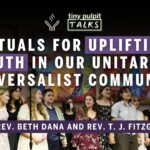On the Road from Greed to Giving | Rev. Beth Dana | 11.26.23

As we travel the road together from Thanksgiving to Advent and Christmas, we reflect on the spirit of generosity in us and in this season.
Sermon Transcript
The Liminal Space Between Gratitude and Giving
All the pumpkins are going to the compost and the Christmas lights are going up, the Thanksgiving dishes are being tucked away and the holiday party invitations coming in. The planning and lists involving Turkey and pies are transitioning to gift lists and holiday card mailing lists. This week we are in a kind of liminal space between gratitude season and giving season. This in-between space invites us to reflect. If we can pause for a moment like we do here at church on what these practices of gratitude and giving really mean. I learned as a child that when someone gives you something or does something for you, you write them a thank you note. It’s just what you do. And so being the dutiful child that I was, I took great pride in writing thank you notes very promptly. When Erin and I got married, my uncle John joked in his toast that given my history, I would probably have all of the wedding gift thank you notes written that night before I went to sleep.
My childhood zeal and efficiency were hard to match then and now, but thank you notes remain an important practice for me. Over the past month, we’ve practiced gratitude in a variety of ways. Some of you stopped by the children’s ministry’s desk to write what you’re thankful for on our gratitude pumpkin. Some of you did 30 days of gratitude on social media with daily posts naming something for which you’re grateful. Some of you made or were given those hand print turkeys with each finger labeled with something a child is thankful for. Some of you engaged in acts of service, gathering and donating Thanksgiving baskets, serving meals and more. And some of you paused before the Thanksgiving meal to say a blessing or maybe went around the table inviting each person to share a word of gratitude. Ideally, practices like these are motivated by a true and deep sense of thankfulness, an acknowledgement of all we’ve been given and a desire to express gratitude for this.
Gratitude as a Religious Discipline
Too often in our society, however, gratitude rituals are merely seasonal lip service. They’re motivated by a sense of obligation or done without much reflection because it’s just what we do. If I’m really honest, there are times when writing thank you notes feels like a mindless obligation, but there are also times when it feels good and meaningful and reminds me of how much love and generosity surrounds and uplifts me. As the proverb says, the proof is in the pudding. Where do these gratitude rituals lead us? What commitments or actions do they inspire? The Reverend Galen Guengerich, Unitarian Universalist minister suggests that the defining religious discipline of Unitarian Universalism is gratitude. Our discipline of gratitude is about he says, “Knowing how much we have been given at acknowledging the scope of our dependence and our interdependence. We express this gratitude through a discipline of saying thank you to loved ones, our communities, the universe, God, and from this discipline or practice of gratitude comes an ethic of gratitude.
Howard Thurman’s Question: Swamp, Reservoir, or Canal?
Because of all the blessings in our lives, we have an obligation to create a world where all people share in this sense of being blessed and thankful, where all know freedom and justice.” We’re called to be generous in both tangible ways and in intangible ways of the spirit. This ethic is what Howard Thurman writes about in the excerpt from Meditations of the Heart that was our reading today. He presents us a choice and asks us, “Will you be a swamp, a reservoir, or a canal?” The swamp represents hoarding and greed. Water flows in, but there is no outlet, so the water becomes stagnant and living things rot. Scary creatures like snakes and alligators find a home there. Swamp people show up as the aggressive Black Friday shopper who mows down other shoppers to reach and pull and take everything that they can get their hands on. It’s the every man for himself philosophy woven into how capitalist society defines success. There’s an inlet but no outlet, no sense of responsibility beyond the getting of things. It’s never enough.
The function of a reservoir, however, is to hold water. The water in the reservoir is available to draw on when needed for life-giving nourishment and there is both inflow and outflow. And a canal exists to channel water. It’s the way water moves from one place to another so it only temporarily holds the water as it flows from its origin to its destination. A canal is a connector and it’s often part of a larger network of canals. “Canal, reservoir, or swamp, which are you?” Thurman asks us.
His question is not only a matter of the movement of resources like water, it’s also a question of spiritual maturity and our role in the larger web of life. Swamp spirituality, as I call it, focuses exclusively on self-improvement, taking in all the spiritual inspiration it can get, but without any community connection or responsibility. Our Unitarian Universalist principle promoting the free and responsible search for truth and meaning would be foreign to someone who embraces swamp spirituality.
Reservoir spirituality is about filling my cup so that I can sustain myself and be there for others. It involves regular spiritual practice to build up its resources for nourishment and resilience. It acknowledges that we are entrusted with the gifts of life that are not only our own. We hold these gifts with great care and we share them with others.
Canal spirituality has both inflow and outflow of resources. People are channels for spirit, for the holy, for blessings to flow through them to others so that in the words of Thurman, in an interview he gave, “All who know us will find in us a benediction breathing peace.”
Interdependence and Giving the Gift of Life
One of the most meaningful ways that I can think of to be a canal is to give the gift of life, whether it’s through blood donation like we’re inviting you to do here at church next Sunday or through being an organ donor or recipient. Every year, at this time, I am reminded of my friend Elizabeth and her dad. I’ve shared their story with you before, but it’s been a few years. Several years ago, Elizabeth almost lost her dad to idiopathic pulmonary fibrosis. His lungs had turned to scar tissue and they didn’t know why at the time. She watched him slip away getting weaker and weaker. One day in August while in the car together, he told Elizabeth what hymns he wanted at his funeral. In November, she had a quilter make a stole out of her dad’s old ties because she thought he might die before her ordination to the ministry in January.
But then right around this time of year, someone died and Elizabeth’s family and several others on organ waiting lists got a call. There was a good match for her dad, and a few days later, he received a life-saving lung transplant. Elizabeth reflects back on this time with gratitude for modern medicine and she reflects on the strangeness of the experience, knowing that someone had died to bring her and her dad and their family this hope. She wondered how the donor’s family had mourned. The transplant saved her dad’s life, but the gift of new life wasn’t just warm and fuzzy. It came with disruption and responsibility and new health complications. He and his family were forever changed.
Something also changed in Elizabeth and how she understands human connection. One day, a year and a half after the transplant, she was out running and she spotted someone wearing donate life gear. She stopped them and said, “Hey, this is weird, but I saw your hat and I just wanted to see what your connection is. My dad is a transplant recipient.” It was a middle-aged man and his mom, and they told Elizabeth, the young man told Elizabeth that his brother had died young of something very rare, and they chose organ donation. They kept getting notifications. His eyes were in Tennessee, his lungs were somewhere else. He had been a very small person, so his heart went to a child. They think sometimes about how those pieces of him are still living all over the country. Elizabeth told them that she would probably never meet or know her dad’s donor family and asked if she could thank them, and she did.
This connection between strangers is evidence of the network of canals, the interdependence of which we’re all a part. Sometimes that interdependence is very physical. The first letter to the Corinthians in the Bible uses the image of one body to describe the beloved community, and this is part of what interdependence means now to Elizabeth. Organs and tissue connecting strangers across time and space. “We need one another to survive,” she says. Not just abstractly, but in our flesh, in our blood, in the choices that we make to give life even amidst death. I wonder,” she says, “What would change if we, if I lived with this knowledge in the forefront of my mind? If my cousin’s heart kept your child alive, if my O negative blood saved the life of the religiously conservative man in your neighborhood, if your uncle’s lungs breathed air into my dad’s body the day he met his granddaughter, how would I act if I really knew that we are not isolated individuals, but part of each other’s being? What grace, messy, vulnerable, and disturbing might come to dwell among us?”
Elizabeth’s life and perspective on human connection is forever changed by this experience because she knows in a visceral way that the gifts of life that flow through us are cause for deep gratitude and that when we share these gifts, we have enough. She asks, “How would we act if we really knew this?”
Building Reservoirs of Gratitude
A couple of weeks ago, I greeted a church member out in the fellowship hall. I said, “Hi, how are you doing today?”
“Good enough,” she replied, and I paused. Good enough. It’s kind of an unusual response and it led to a conversation about what is enough and left me pondering this question long after our conversation had ended. What is enough? There’s no single answer to this question, but it’s one that all of us would do well to ponder, particularly in this season of anxiety about enough. Did I get enough presents? Did I have enough money to buy the gifts that I want to give others? Will we have enough food for everyone? Am I making the season special enough for my kids? Is my home good enough to host others? Will I have enough patience to engage with uncle so-and-so and cousin so-and-so at the holiday dinner table? Are there enough hours in the day to do all the holiday things and go to all the holiday parties? Enough, enough, enough.
Just yesterday I was out for lunch to celebrate a friend’s son’s eighth birthday and the birthday boy after we ate was jumping up and down, batting around a bunch of helium filled Marvel Avengers balloons. And as the server was trying to navigate around him, his mother said, “Enough, Jonah.” And Jonah, in true eight-year-old style, batted the balloons once more and said, “It’s never enough.” But as Jonah and my own kids will learn as they grow, often what we have is good enough. It’s all a matter of perspective. When we have an inner reservoir on which we can draw, a well of gratitude that inspires us and others, we will always have enough.
As we move from one season to another with an inflow of gratitude from thanksgiving and an outflow of giving in many forms in the weeks ahead, Howard Thurman’s words remind us that it’s important to pause and build our reservoir of resources that will sustain us. This season is full of opportunities to do so, to experience awe and wonder, to witness beauty, to feel the contagious joy of little ones, to know the rewards of giving, and yes, even to find moments of stillness in the midst of the holiday busyness. Imagine what grace might come to dwell among us. “On the road from greed to giving, love will guide us through the hard night,” says to hymn. May you know that what you have and who you are is enough, and may this sense of abundance, inspire giving and generosity of spirit in the days ahead. Amen.








